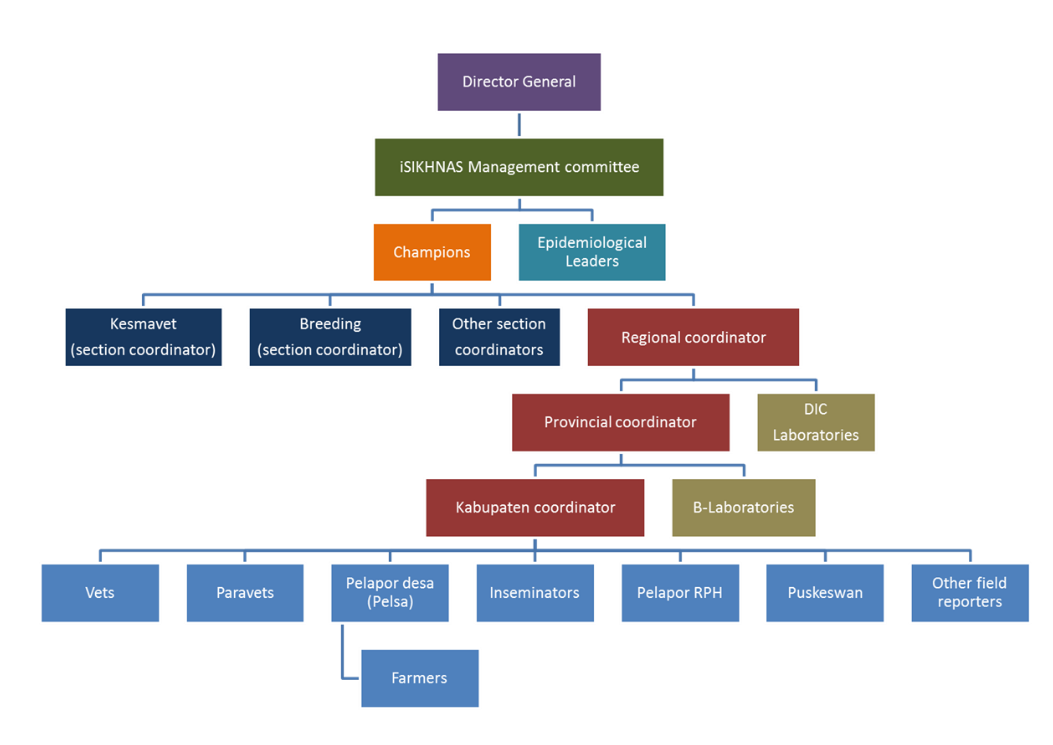Manuals:System Coordinator
Daftar isi
Introduction
Basic founding principles of iSIKHNAS
As any system matures, it is valuable to keep in mind of the founding principles upon which it was designed and built. iSIKHNAS will become the backbone of all Indonesia's efforts to improve animal health, secure the livelihoods of livestock owners and ensure good management of production and food supply in the country. It was designed and built in careful collaboration with a wide range of dedicated staff working for improved animal health in many different regions.
iSIKHNAS was designed so that it should;
- be flexible, user-friendly, sustainable and bring benefit to all of its users.
- meet the needs of users from as many sectors of the livestock industry as possible.
- use appropriate technology and not require great change to existing systems.
- integrate existing systems to facilitate the collaborative use of data.
- simplify and ease the data entry burden and ensure the rapid availability of data from the field.
- recognise the vital contribution each user plays in the transfer of information.
- provide benefit and good service to all its users.
- make all data widely and freely available for decision making at all levels and for a multitude of purposes.
As a system coordinator, your leadership and guidance will help to ensure these principles remain fundamental to the system and its users. iSIKHNAS is not a data collection tool but an integrated system which will empower its users with access to relevant, up to date information rapidly and cheaply so that they can concentrate on core activities. As a coordinator, you are part of the new animal health service which is built on good relationships, clear and timely communication, leadership and support.
Whilst much effort has been gone into minimising change, the new iSIKHNAS will inevitably bring about some change for all staff. Every coordinator will have to be equipped to chaperone newcomers to the system, assist in training and system operations, offer support by telephone and email, monitor reporting, errors and address weaknesses. Staff should be congratulated and thanked, given positive reinforcement for their successful engagement with the system and assisted wherever there are difficulties. Collaboration with livestock owners and their communities should give benefit or have positive outcomes at every interaction. At every step, we should remember that this is a system for providing a service to all its users equally. If everyone contributes with this in mind we will all benefit.
iSIKHNAS coordination and management model
The management of iSIKHNAS is overseen by a committee of senior staff from various directorates general and subdirectorates. The committee is supported by the technical expertise from the system administrators or Champions and the Epidemiology Advisory group.
Sections are represented by an appointed coordinator who is responsible for the oversight of the specialist activities such as abattoir reporting, breeding and production and quarantine for example.
Each administrative level will have a coordinator appointed and trained. So, each region, province and kabupaten will have a designated coordinator. Some areas may choose to share the coordination between two staff members to ensure that one person is burdened with too much responsibility.
The most important roles are undertaken by the field staff - dinas vets and para-vets - and the village reporters (pelsa). These individuals are the source of most data and their continued collaboration is vital to the ongoing strength of iSIKHNAS.
Job description
An iSIKHNAS coordinator is responsible for the smooth operations by staff registered and trained to use the system in a particular geographical/administrative area.
Leadership
- Act as an ambassador, information source and spokesperson for the system in the district
- Safeguard the philosophy and principals upon which iSIKHNAS has been built
- Ensure users can access and refer to you easily and freely.
- Share the coordination role with one or more deputies.
- Respond to requests for new data reports
User development and administration
- Register new users Pelsa and Dinas correctly
- Train new users Pelsa and Dinas in all relevant aspects of the system
- Ensure user details are up to date
- Facilitate or assist training of specific user groups such as abattoir, production, police or health department, for example.
- Supervise and monitor all registered users in the area of responsibility
- Register local infrastructure and create new location codes where necessary and ensure these are up to date.
Support and monitoring
- Monitor the message log and respond quickly to problems in a supportive manner
- Respond to feedback and questions from users in a timely and supportive manner
- Assist para-vets to respect and support the work of village pelsa
- Monitor and evaluate the performance of the team, set goals and priorities for improvement and development
- Identify training needs of staff based on monitoring of field reports
Reporting
- Report technical problems, inadequacies or redundancies immediately to the Champions and Provincial coordinator
Analysis and management
- Assist in the analysis of data for the evaluation of activities, performance and priority setting.
- Assist in the analysis of data for the purposes of budget advocacy for support for ongoing and new activities
- Make recommendations from the results of data analysis
- Manage surveillance, vaccination and population data collection activities through iSIKHNAS.

